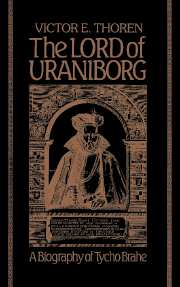Book contents
- Frontmatter
- Contents
- Preface
- 1 A Noble Humanist
- 2 The New Star
- 3 Becoming a Professional
- 4 The First Years on Hven: 1576–1579
- 5 Urania's Castle
- 6 The Flowering of Uraniborg
- 7 First Renovations: The Solar Theory
- 8 The Tychonic System of the World
- 9 High Tide: 1586–1591
- 10 The Theory of the Motion of the Moon
- 11 The Last Years at Uraniborg
- 12 Exile
- 13 A Home Away from Home?
- Epilogue
- Appendix 1 Abbreviations for Frequently Cited Sources
- Appendix 2 Glossary of Technical Terms
- Appendix 3 The Tychonic Lunar Theory
- Appendix 4 Figures for Footnotes
- Appendix 5 Tycho's Dwellings in Exile
- Appendix 6 Letters, 1599–1601
- Author Index
- Subject Index
8 - The Tychonic System of the World
Published online by Cambridge University Press: 04 May 2010
- Frontmatter
- Contents
- Preface
- 1 A Noble Humanist
- 2 The New Star
- 3 Becoming a Professional
- 4 The First Years on Hven: 1576–1579
- 5 Urania's Castle
- 6 The Flowering of Uraniborg
- 7 First Renovations: The Solar Theory
- 8 The Tychonic System of the World
- 9 High Tide: 1586–1591
- 10 The Theory of the Motion of the Moon
- 11 The Last Years at Uraniborg
- 12 Exile
- 13 A Home Away from Home?
- Epilogue
- Appendix 1 Abbreviations for Frequently Cited Sources
- Appendix 2 Glossary of Technical Terms
- Appendix 3 The Tychonic Lunar Theory
- Appendix 4 Figures for Footnotes
- Appendix 5 Tycho's Dwellings in Exile
- Appendix 6 Letters, 1599–1601
- Author Index
- Subject Index
Summary
As Uraniborg took shape, word of the remarkable new establishment began to circulate among the scholars who perambulated across northern Europe. By the mid-1580s, Tycho was receiving not only numerous applications from aspiring disciples, but also a steady stream of overnight visitors from the summer circuit of touring intellectuals and curiosity seekers. Among all of those who ever appeared on Hven in either category, the one who probably made the greatest impression on Tycho turned up in July 1580. The visitor was a mathematician named Paul Wittich. He and Tycho seem to have crossed paths already at Wittenberg during one of Tycho's stops at the university there. But that first meeting had obviously been very brief, for when Wittich appeared at Uraniborg, he had with him an introduction from Hayek. Of course, even without such a formality, Wittich would have been more than welcome, for Tycho at that time still had only Flemløse for observational help and intellectual company.
Like Flemløse and all the rest of Tycho's later recruits, Wittich came without much experience in the use of astronomical instruments: Tycho was later to report that his smiths were very amused by Wittich's first attempts to observe. The complete theoretician, Wittich not only knew none of the constellations but unrepentantly argued that such knowledge was no more necessary for an astronomer than a knowledge of herbs was for a physician.
- Type
- Chapter
- Information
- The Lord of UraniborgA Biography of Tycho Brahe, pp. 236 - 264Publisher: Cambridge University PressPrint publication year: 1991



